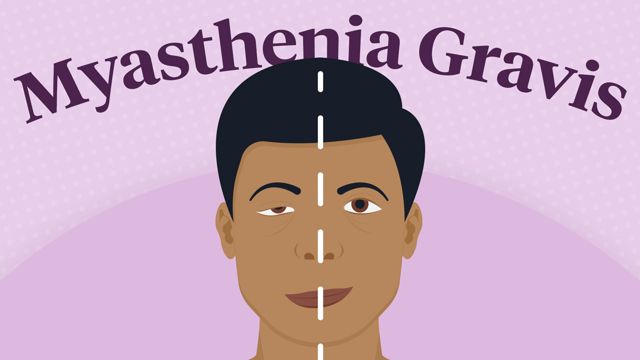Myasthenia gravis is an autoimmune disease that impairs nerve cell and muscle transmission. Depending on the affected locations, it may result in various symptoms, such as muscle weakness.
The neuromuscular condition known as myasthenia gravis (MG) results in weakness in the skeletal muscles, which are the muscles your body utilizes to move.
When there is a disconnection in the nerve-muscle connection, MG results, and muscle weakness results from this dysfunction, which stops important muscle contractions from happening.
Over 70,000 Americans have been diagnosed with myasthenia gravis, according to the Myasthenia Gravis Foundation of America.
In this blog, you will learn about the Myasthenic Gravis symptoms, causes, and what are the various treatment options available for the patients who are experiencing Myasthenia Gravis:
Myasthenia Gravis
With myasthenia gravis, your voluntary muscles become weak and fatigue easily. This is the result of a breakdown in nerve-muscle communication.
A cure for myasthenia gravis does not exist. Symptom relief may come with treatment. These symptoms can include double vision, drooping eyelids, weakness in the muscles of the arms or legs, and difficulty speaking, chewing, swallowing, or breathing.
Symptoms
Well, Myasthenia Gravis affects different parts of the body, and Myasthenia Gravis symptoms are listed below:
Myasthenia gravis causes muscular weakness that deteriorates with the use of the affected muscle. Muscle weakness can come and go because, the majority of the time, the symptoms improve with rest. But with time, the symptoms usually worsen. Usually, a few years after the sickness starts, they get the worst of it.
You could have myasthenia gravis, and it could damage any muscle you can control. The affected muscle groups vary in frequency of occurrence.
Eye Muscle
The early signs of myasthenia gravis usually affect the eyes in over half of cases. Symptoms consist of:
- Ptosis is the term for the drooping of one or both eyelids.
- Diplopia is the term for double vision, which can be either vertical or horizontal and gets better or goes away when one eye is closed.
Face and Throat Muscle
The facial and neck muscles are affected in around 15% of cases of myasthenia gravis. These signs may:
- Make it challenging to speak: Depending on which muscles are affected, your voice may sound nasal or soft.
- Cause difficulty swallowing: You could find it difficult to eat, drink, or take medication if you choke easily. Liquids that you are trying to swallow occasionally come out of your nose.
- Impact on chewing: Halfway through a meal, the chewing muscles may start to ache. This is particularly valid if you’ve been consuming tough foods like steak.
- Alter your expressions: For instance, your smile could resemble a growl.
Neck and Limb Muscles
Additionally, myasthenia gravis can result in weakness in the arms, legs, and neck. Leg weakness can have an impact on movement. It is difficult to hold up the head when neck muscles are weak.
When You Should See a Doctor?
Consult with your healthcare provider if you have problems in:
- Breathing
- Swallowing
- Walking
- Seeing
- Chewing
- Using your arms or hands
- Holding up your head
What Causes Myasthenia Gravis?
The Muscular Dystrophy Association (MDA) states that a combination of abnormal antibodies and thymus gland issues may cause MG.
Among the potential causes and risk factors are:
An immune system response
When your immune system unintentionally targets healthy tissue, autoimmune diseases can result. These antibodies, which often target dangerous chemicals in the body, kill nerve cells in MG instead.
Muscles are unable to contract in response to acetylcholine because the antibodies damage or block cholinergic receptors. Muscle weakening is the outcome of this.
It’s unknown exactly what triggers this immunological response. The MDA implies that the body might target acetylcholine in response to particular viral or bacterial proteins.
Your chance of having an autoimmune disease like MG may be raised by a family history of autoimmune diseases.
Abnormalities of the thymus gland
Throughout your life, the thymus gland regulates healthy immune responses and normally expands until adolescence. The size of the gland decreases after puberty.
The thymus gland remains large in many persons with MG. It is also possible to develop benign or malignant tumors of the thymus gland, which could disrupt the synthesis of essential immune cells. Additionally, the larger thymus gland generates acetylcholine-blocking antibodies.
Thymic hyperplasia, or abnormalities of the thymus gland, affects about 75% of MG patients, and 15% of them also have malignancies.
Because of this, the thymus gland might train your immune system incorrectly, which could result in the loss of immune cells that causes MG, according to researchers.
Biological Infusion Therapy Treatment
The treatment of myasthenia gravis (MG) is aimed at preventing muscle weakening. Medications are commonly used, such as steroids, acetylcholinesterase inhibitors (AChE), and other immunosuppressants. However, symptoms are not always relieved by these.
When MG does not improve or worsens in response to these drugs, it is known as resistant MG. This happens ten percent of the time. Biologics—more especially, antibody-based drugs—may be an immunosuppressive treatment option for people with refractory MG. Antibodies are proteins produced by the immune system of the body that eliminate infections.
Adults with anti-acetylcholine receptor (AChR) antibodies and non-refractory generalized MG may also be candidates for several biologics. This group includes eight out of ten MG sufferers.
The most common biologics used to treat MG, an autoimmune disease, are monoclonal antibodies. The immune system normally produces proteins known as antibodies to fight infections. An autoimmune illness is characterized by the body attacking healthy tissue instead of infections.
Synthetic molecules produced in a lab to imitate the immune system’s functioning of healthy antibodies are known as monoclonal antibodies. Whereas steroids and other drugs affect the immune system as a whole, these monoclonal antibodies are designed to target a single, particular physiological activity.
Unlike the toxic antibodies in MG that cause disease, these monoclonal antibodies target a biological pathway that may aid in reducing or avoiding disease. All of the monoclonal antibody treatments for MG cause immunosuppression since they all target immune system processes.
The targeted focus of this therapy may lead to better results and fewer side effects. It may also be a dangerous substitute for long-term steroid therapy.
Biologics for Myasthenia Gravis Treatment
Following are some of the antibody-based biologics that are the approved biologics for specific types of MG:
- People with AchR-positive refractory MG can take eculizumab (Soliris®) and efgartigimod (Vyvgart®).
- People with MuSK-positive refractory MG can take rituximab (Rituxan®).
- People with AChR-positive generalized MG can take ravulizumab-cwvz (Ultomiris®).
These biologics are basically the myasthenia gravis medication. Consult your doctor if you are unsure of the type of MG you have.
The intravenous administration of biological medicines is common. Reactions to infusions and allergies are possible. Your doctor will keep an eye out for such issues and monitor you.
It could be necessary to stop taking the medication if you have a severe reaction to a biological infusion. Inform your doctor about all of your medical problems and the medicines, vitamins, and supplements you use before starting biologics for myasthenia gravis. These also cover over-the-counter medicines.
Contact Fuse Infusion for Myasthenia Gravis Treatment
If your doctor has recommended biologic Infusion therapy treatment for myasthenia gravis, we at Fuse Infusion offer you the best treatment services. We treat myasthenia gravis through myasthenia gravis medications, which are specialized biologics, and help our patients overcome this chronic disease.
Each Fuse Infusion patient receives direct care and treatment from our licensed professionals throughout biological infusion therapy, providing thorough medical management.
From start to end, each patient receives individualized care. When required, on-call medical professionals are accessible.
At Fuse Infusion, we believe in offering premium-quality services to our patients. So, contact us to receive a biologic infusion today!

